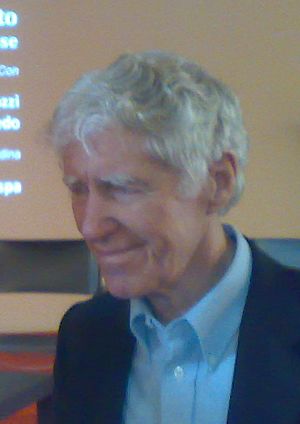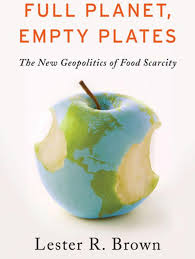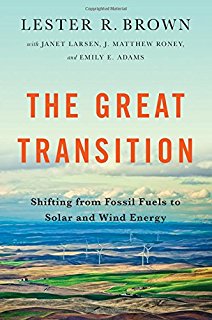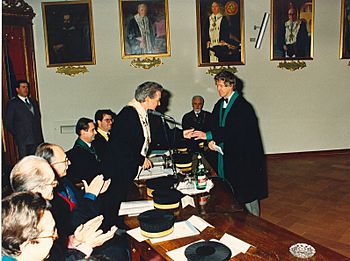Lester R. Brown facts for kids
Quick facts for kids
Lester R. Brown
|
|
|---|---|
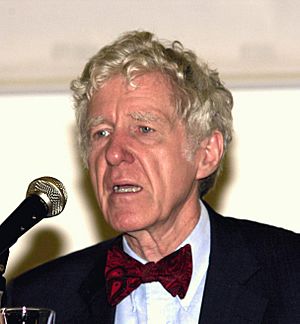
Lester Brown in 2003.
|
|
| Born |
Lester Russel Brown
March 28, 1934 Bridgeton, New Jersey, U.S.
|
| Education | Rutgers University (B.S., 1955) University of Maryland (M.S., 1959) Harvard University (M.P.A., 1962) |
| Occupation | Global environmental analyst, author |
| Years active | 1963–2015 |
| Known for | Analysis of global warming, food shortages, water depletion and energy shortages |
Lester Russel Brown (born March 28, 1934) is an American expert who studies the environment. He is known for starting important groups like the Worldwatch Institute and the Earth Policy Institute. These groups research global environmental problems. Many people, including a BBC radio host, have called him a "pioneer environmentalist." This means he was one of the first and most important people to work on protecting our planet.
Lester Brown has written or helped write over 50 books about environmental issues around the world. His books have been translated into more than 40 languages. One of his recent books, The Great Transition: Shifting from Fossil Fuels to Solar and Wind Energy (2015), talks about how the world is moving from old energy sources like coal and oil to cleaner ones like solar and wind power. He also wrote Full Planet, Empty Plates: The New Geopolitics of Food Scarcity (2012).
Brown believes that rising food prices can cause big problems for countries, especially poorer ones. He has said that food shortages could even "bring down civilization." In 2011, he wrote in Foreign Policy magazine that food issues were already causing protests and changes in many countries.
The Washington Post newspaper has called Lester Brown "one of the world's most influential thinkers." He has received 26 special degrees from universities and a special award called a MacArthur Fellowship. As early as 1978, in his book The Twenty-Ninth Day, he warned about the dangers of harming nature. He spoke about overfishing, cutting down too many trees, and turning land into desert. In 1986, the Library of Congress asked for his personal papers because his ideas had already made a big impact on how people thought about world population and resources. Former President Bill Clinton even said that "we should all heed his advice."
In the mid-1970s, Brown helped develop the idea of sustainable development. This means using resources in a way that meets our needs now without harming the ability of future generations to meet their own needs. He has received many awards for his work, including the 1987 United Nations Environment Prize and the 1994 Blue Planet Prize. In 1995, he was named one of "50 Great Americans" by Marquis Who's Who. He also received a special medal from the President of Italy and became an honorary professor in China. He lives in Washington, D.C. and retired in June 2015.
Contents
Early Life and Farming Roots
Lester Brown grew up on a farm in Bridgeton, New Jersey. His family's farm did not have running water or electricity. He loved to read from a young age and was very interested in World War II. He would borrow old newspapers to follow the news. He also enjoyed reading about famous people like Abraham Lincoln and Marie Curie.
From a young age, he worked hard on the farm, milking cows and cleaning stables. He was very creative and started different businesses with his younger brother, Carl. They raised pheasants and chickens to sell. In 1951, they started a tomato farm that grew to be one of the biggest in New Jersey, selling over 1.5 million pounds of tomatoes each year. Brown once said that farming was all he ever wanted to do. He felt it was a great job because it involved knowing about soils, weather, plants, insects, and even politics.
Education and Early Career
After studying agricultural science at Rutgers University and graduating in 1955, Lester Brown spent six months living in rural India. This experience showed him firsthand the problems of food and population. His time in India changed his life. When he returned to the United States, growing tomatoes no longer felt as exciting.
Brown decided he wanted to work on global food issues. He realized he needed more education to work for the U.S. Department of Agriculture's (USDA) Foreign Agricultural Service. So, he quickly earned a master's degree in agricultural economics from the University of Maryland. In 1959, he joined the USDA as an expert on international agriculture in Asia. He later took time off to earn another master's degree from Harvard University.
In 1963, Brown wrote a book called Man, Land and Food. It was the first detailed look at world food, population, and land resources for the rest of the century. This study was featured in a magazine and caught the attention of the Secretary of Agriculture, Orville Freeman. Freeman was impressed and offered Brown a job on his team. Brown's main role was to help increase food production in developing countries.
In 1969, he left the government to help start the Overseas Development Council. He also believed strongly in the "Green Revolution," which used better seeds and farming methods to help solve hunger. He thought this technology was very important. However, he later saw that fast population growth in many countries was making it hard for food production to keep up.
Working for the Environment
In 1974, Lester Brown started the Worldwatch Institute. This was the first research group focused on global environmental issues. At Worldwatch, he created many important reports and magazines, like the annual State of the World reports. He hired young, passionate people who were good at understanding many different topics, not just one specific area.
The Worldwatch Institute became known as a respected group that studied environmental problems. Their goal was to teach people and governments about these issues and suggest solutions. Brown believed their job was to connect all the different pieces of environmental information. Because of his work, he was given a special "genius award" by the MacArthur Foundation in 1986.
In 1991, Brown talked about two big environmental challenges: population growth and the decline of the environment. He believed these problems came from economic activities that were not sustainable. He also felt that solar power was the best long-term energy choice for humanity. He said, "We have the chance to build an economic system that can last as long as the sun. It's an exciting challenge; it's doable."
In 2001, he left Worldwatch Institute to start the Earth Policy Institute. His goal was to create a plan to help save civilization. At this institute, he used his broad knowledge to see big trends and find global solutions to environmental problems. Some of his important books from this time include World on the Edge: How to Prevent Environmental and Economic Collapse (2011) and the Plan B series. His last book was The Great Transition: Shifting from Fossil Fuels to Solar and Wind Energy (2015).
Lester Brown retired on June 30, 2015, and the Earth Policy Institute closed. His work continues to be remembered. Rutgers University, where he studied, has a special reading room named after him. It holds his books, awards, and recordings of his interviews. The university also keeps the Earth Policy Institute's website online so that all the information is still available. His early papers are kept at the Library of Congress.
Environmental Warnings and Solutions
Lester Brown has often been called an "environmental Paul Revere" because he warns people about serious environmental dangers. In 2008, he told an audience that "unless civilization changes its ways, its end is truly near." He explained that we are in a race between natural "tipping points" (where environmental changes become irreversible) and political changes. He stressed that the market needs to show the true environmental cost of things. He pointed out that ignoring environmental costs is like a company hiding its debts, which can lead to big problems. He also spoke about fast population growth, cutting down forests, and rising food and oil prices.
Offering Solutions
In 2001, Brown suggested a "tax shifting" idea. This would mean lowering income taxes and instead taxing activities that harm the environment, like carbon emissions. He called this an "honest market" because it would make the hidden costs of climate change and pollution visible. For example, a tax on carbon would help pay for the damage caused by burning fossil fuels. He said that by not accounting for these environmental costs, society faces the same risks as a company that hides its major expenses.
Brown believed this tax shift would create an "honest market" that tells the "ecological truth." In 2011, he estimated the costs of such a shift, including using better technology and renewable energy. In December 2008, he also showed how investing in renewable energy and energy efficiency could create many new jobs.
Key Books
Lester Brown has written or co-written over 50 books, translated into about 40 languages. Some of his earlier books include Man, Land and Food and World Without Borders. His 1995 book, Who Will Feed China?, questioned how China would feed its large population, leading to many discussions.
In May 2001, he started the Earth Policy Institute to create a plan for a sustainable economy. In November 2001, he published Eco-Economy: Building an Economy for the Earth. He also wrote the Plan B series, including Plan B 4.0 (2009) and World on the Edge (2011). In 2012, he published Full Planet, Empty Plates.
Who Will Feed China?
In this 1995 book, Brown warned about the pressure on world resources as more countries, especially China, developed. He wrote that China might need to import so much grain that it could cause world food prices to rise very high. In 2014, he updated his forecast, noting that China had indeed become a major grain importer.
Outgrowing the Earth
This book, published in 2004, explains how human demands are using up the Earth's natural resources too quickly. It shows how this environmental damage is hurting food production worldwide. Brown wrote that less crop production is due to global warming, water shortages, shrinking farmland in countries like China, and population growth.
Plan B 4.0
Published in 2009, this book continues the ideas from his earlier works. It serves as a strong warning for world leaders to start "mobilizing to save civilization." It emphasizes that time is running out. At California State University, Chico, Plan B is required reading for all new students and is used in many different classes.
Breaking New Ground: A Personal History
In 2013, Brown published his autobiography. In this book, he shares the important events in his life that led him to create the first research institute focused on global environmental issues. Many experts have praised the book, calling Lester Brown a "true American hero" and an "eco-warrior."
The Great Transition: Shifting from Fossil Fuels to Solar and Wind Energy (2015)
This book talks about the fast growth of a global energy revolution. Countries are moving away from coal and nuclear power and using more renewable sources like solar and wind. Solar energy, once used for small homes, is now used in huge projects worldwide. Some wind farms can produce as much electricity as several nuclear power plants. New transportation systems, especially in countries like China, are also using more electricity, and more people are riding bicycles.
Awards and Recognition
Lester Brown has received many awards and honors, including 25 special degrees from universities. He is also an honorary professor at the Chinese Academy of Sciences.
- 1965: Superior Service award from the United States Department of Agriculture
- 1987: UN Environmental prize
- 1989: World Wildlife Fund for Nature - International award
- 1991: Humanist of the Year award from the American Humanist Association
- 1994: Blue Planet prize from the Asahi Glass Foundation
- 1995: Rachel Carson Environmental Achievement award
- 2002: Italian Presidential medal
- 2012: Earth Hall of Fame Kyoto
- 2012: Green Carpet Award for Distinguished Service, Harvard University
He was also named one of the top 100 global thinkers by Foreign Policy magazine in both 2010 and 2011.
See also
 In Spanish: Lester R. Brown para niños
In Spanish: Lester R. Brown para niños
 | Janet Taylor Pickett |
 | Synthia Saint James |
 | Howardena Pindell |
 | Faith Ringgold |


